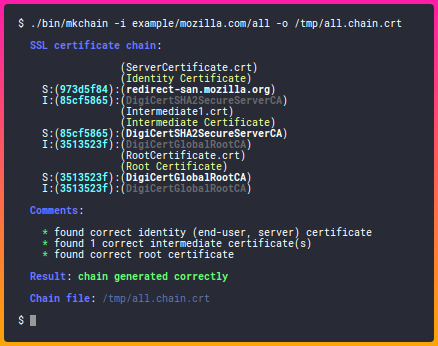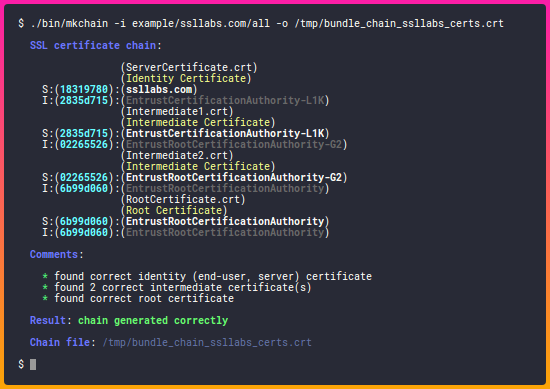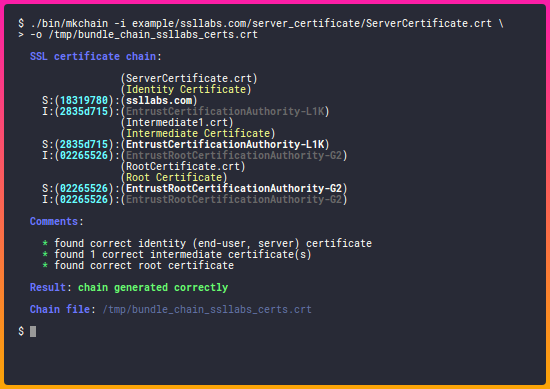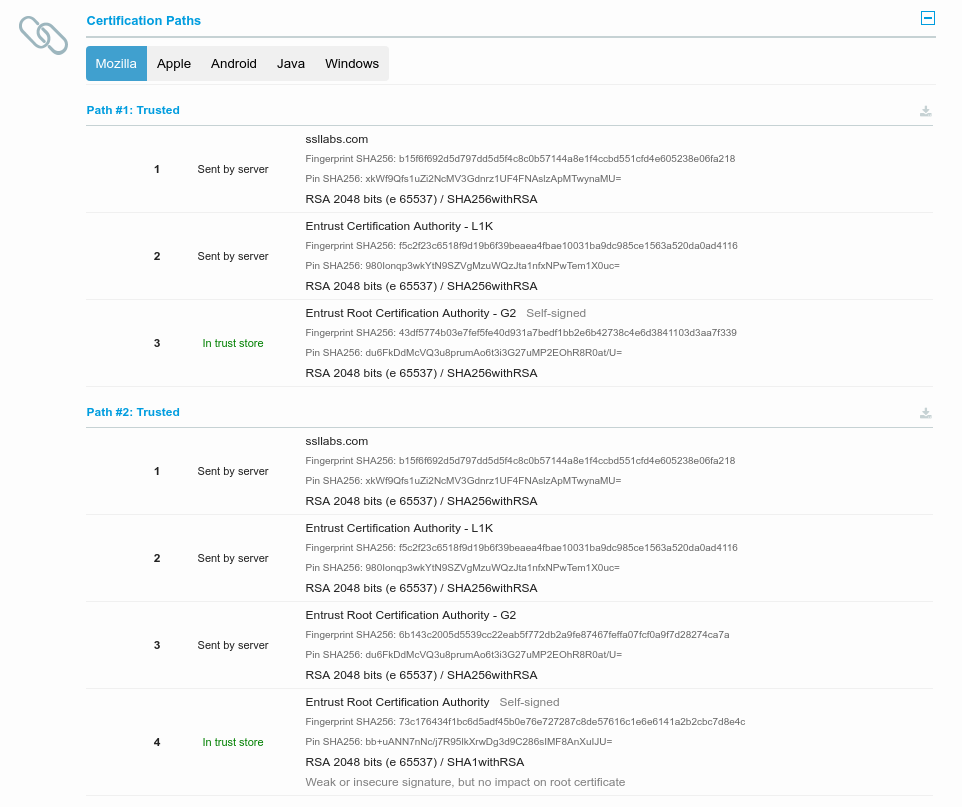trimstray / Mkchain
Programming Languages
Projects that are alternatives of or similar to Mkchain
mkchain
Open source tool to help you build a valid SSL certificate chain.
Description • How To Use • Parameters • How it works • Requirements • Other • License
Description
Is an open source tool to help you build a valid SSL certificate chain. Also can help you fix the incomplete chain and download all missing CA certificates. You can also download all certificates from remote server and get your certificate chain right.
How To Use
It's simple:
# Clone this repository
git clone https://github.com/trimstray/mkchain
# Go into the repository
cd mkchain
# Install
./setup.sh install
# Run the app
mkchain -i /data/certs -o /data/chain.crt
- symlink to
bin/mkchainis placed in/usr/local/bin- man page is placed in
/usr/local/man/man8
Parameters
Provides the following options:
Usage:
mkchain <option|long-option>
Examples:
mkchain --in Root.crt --in Intermediate1.crt --in Server.crt --out bundle_chain_certs.crt
mkchain --in /tmp/certs --out bundle_chain_certs.crt --with-root
mkchain -i Server.crt -o bundle_chain_certs.crt
mkchain -i https://incomplete-chain.badssl.com/ --with-root
Options:
--help show this message
--debug displays information on the screen (debug mode)
-i, --in add certificates to merge (file, multiple files, directory with ssl certificates
or remote domain)
-o, --out saves the result (chain) to a file
--with-root add root certificate to certificates chain
-o|--out- without this parammkchainsave output chain tomkchain/chains/directory.
How It Works
Before read it, please see article about SSL Certificate Chain.
Let's start with ssllabs certificate chain. They are delivered together with the mkchain and can be found in the example/ssllabs.com directory which additionally contains the all directory (containing all the certificates needed to assemble the chain) and the server_certificate directory (containing only the server certificate).
The correct chain for the ssllabs.com domain (the result of the openssl command):
Certificate chain
0 s:/C=US/ST=California/L=Redwood City/O=Qualys, Inc./CN=ssllabs.com
i:/C=US/O=Entrust, Inc./OU=See www.entrust.net/legal-terms/OU=(c) 2012 Entrust, Inc. - for authorized use only/CN=Entrust Certification Authority - L1K
1 s:/C=US/O=Entrust, Inc./OU=See www.entrust.net/legal-terms/OU=(c) 2012 Entrust, Inc. - for authorized use only/CN=Entrust Certification Authority - L1K
i:/C=US/O=Entrust, Inc./OU=See www.entrust.net/legal-terms/OU=(c) 2009 Entrust, Inc. - for authorized use only/CN=Entrust Root Certification Authority - G2
2 s:/C=US/O=Entrust, Inc./OU=See www.entrust.net/legal-terms/OU=(c) 2009 Entrust, Inc. - for authorized use only/CN=Entrust Root Certification Authority - G2
i:/C=US/O=Entrust, Inc./OU=www.entrust.net/CPS is incorporated by reference/OU=(c) 2006 Entrust, Inc./CN=Entrust Root Certification Authority
The above code presents a full chain consisting of:
-
Identity Certificate (Server Certificate)
issued for ssllabs.com by Entrust Certification Authority - L1K
-
Intermediate Certificate
issued for Entrust Certification Authority - L1K by Entrust Root Certification Authority - G2
-
Intermediate Certificate
issued for Entrust Root Certification Authority - G2 by Entrust Root Certification Authority
-
Root Certificate (Self-Signed Certificate)
issued for Entrust Root Certification Authority by Entrust Root Certification Authority
Scenario 1
In this scenario, we will chain all delivered certificates. Example of running the tool:
Scenario 2
In this scenario, we only use the server certificate and use it to retrieve the remaining required certificates. Then, as above, we will combine all the provided certificates. Example of running the tool:
Certificate Chain
In order to create a valid chain, you must provide the tool with all the necessary certificates (if you set directory for -i|--in param). It will be:
- Server Certificate
- Intermediate CAs and Root CAs
This is very important because without it you will not be able to determine the beginning and end of the chain.
If you set only certificate file as a
-i|--invalue,mkchainautomatically download all necessary certificates.
However, if you look inside the generated chain after generating with mkchain, you will not find the root certificate there.
Why? Because self-signed root certificates need not/should not be included in web server configuration. They serve no purpose (clients will always ignore them) and they incur a slight performance (latency) penalty because they increase the size of the SSL handshake.
If you want to add a root certificate to the certificate chain, call the utility with the --with-root parameter.
Certification Paths
mkchain allows use of two certification paths:
Output comments
When generating the chain of certificates, mkchain displays comments with information about certificates, including any errors.
Here is a list of all possibilities:
not found identity (end-user, server) certificate
The message is displayed in the absence of a server certificate that is the beginning of the chain. This is a unique case because in this situation the mkchain ends its operation displaying only this information. The server certificate is the only certificate required to correctly create a chain. Without this certificate, the correct chain will not be created.
found correct identity (end-user, server) certificate
The reverse situation here - message displayed when a valid server certificate is found.
not found first intermediate certificate
This message appears when the first of the two intermediate certificates is not found. This information does not explicitly specify the absence of a second intermediate certificate and on the other hand it allows to determine whether the intermediate certificate to which the server certificate was signed exists. Additionally, it can be displayed if the second intermediate certificate has been delivered.
not found second intermediate certificate
Similar to the above, however, it concerns the second intermediate certificate. However, it is possible to create the chain correctly using the second certification path, e.g. using the first intermediate certificate and replacing the second with the main certificate.
one or more intermediate certificate not found
This message means that one or all of the required intermediate certificates are missing and displayed in the absence of the root certificate.
found 'n' correct intermediate certificate(s)
This message indicates the number of valid intermediate certificates.
not found correct root certificate
The lack of the root certificate is treated as a warning. Of course, when configuring certificates on the server side, it is not recommended to attach a root certificate, but if you create it with the mkchain, it treats the chain as incomplete displaying information about the incorrect creation of the chain.
an empty CN field was found in one of the certificates
This message does not inform about the error and about the lack of the CN field what can happen with some certificates (look at example/google.com). Common Name field identifies the host name associated with the certificate. There is no requirement in RFC3280 for an Issuer DN to have a CN. Most CAs do include a CN in the Issuer DN, but some don't, such as this Equifax CA.
Requirements
mkchain uses external utilities to be installed before running:
- OpenSSL (testing on 1.1.0g/h)
This tool working with:
- GNU/Linux (testing on Debian and CentOS)
- Bash (testing on 4.4.19)
MacOS/FreeBSD:
- replace for getopt(1) that supports GNU-style long options (
pkg install getopt) - also work on MacOS with
greadlinkfrom coreutils (installed via homebrew)
Other
Contributing
See this.
Project architecture
See this.
License
GPLv3 : http://www.gnu.org/licenses/
Free software, Yeah!






